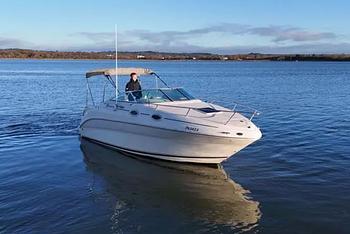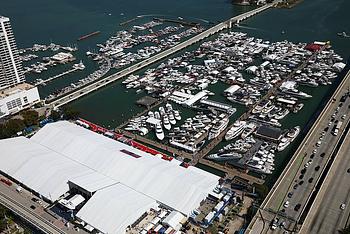Buying a boat is an act of passion. A love for the sea, the sense of freedom you feel when sailing, and the sport of boating combine to create a true love affair which, for most, is the main catalyst for saying ‘let’s go for it’. Yet time constraints mean you might not get to spend quite as much time on your beloved asset as you might like, and the boat lamentably spends too much time idle – and costing you money in the meantime. With berthing costs, insurance and maintenance an ever-present part of all boat owners’ budgets, is there a way you can make some revenue from your boat when you’re not using it and off-set some of those costs? Can you make money chartering a boat? The answer is a resounding yes, and here we take a look at ways you can make your boat pay for itself.
Ways of chartering your boat
Chartering your boat for others to use is the most common way of earning an income from your boat. The charter market has long been a thriving industry, with charterers willing to pay good money for the private use of a boat, whether it’s a luxury yacht, a weekend sailboat or a fishing day boat.
There are a myriad of different ways you can charter your boat, and the best part is that you can stay firmly in the captain’s seat (proverbially or not) as you decide which set-up works best for you. Choosing to charter your boat yourself is one option, you will need to advertise your boat, liaise with charterers, make bookings, hire a captain and crew (or captain it yourself, once you have a commercially endorsed license (UK, USA, Europe: Do You Need Licence to Sail a Boat?)), commercially insure the yacht and provision your boat. While this option means you save the commission costs of a charter agent, there is a lot more work involved for you…time you could be spending on your boat yourself.
Boat charter agencies are set up to do the hard work for you. In return for a set commission (typically between 10% - 20%), they will ensure all paperwork is in order, liaise with charterers and your crew, source professional skippers, offer a comprehensive contract and make sure everything goes smoothly. Whether you’ve got an 80 metre (260 feet) motor yacht to charter or a 12 metre (40 feet) catamaran, there are specialist charter agents the world over, offering everything from bareboat charters to crewed charters.
Bareboat Yacht Charters
As the name suggests, this is the simplest form of yacht charter as it doesn’t require you supplying a crew or offering any provisioning. Charterers with sailing or boating qualifications can charter your boat and take full command of it, planning their own itinerary, ensuring it is provisioned and navigating and berthing it themselves. The plus side for you is a reduction in running costs although the charter price will reflect this. On the downside, there may be a smaller market of potential charterers for your particular boat if they don’t have the right sailing qualifications. Most bareboat charters are on sailing monohulls and catamarans, although there is growing demand for more motor yachts.
Crewed Charter Boats
Crewed charter boats offer a higher level of service, and are available for anyone to charter. On smaller yachts under approximately 18 metres (60 feet) a crew would usually consist of a captain and or a chef/steward, while larger yachts will require more crew. Provisioning is done according to the guests’ preferences, with meals cooked for them, the itinerary planned and the captain taking charge of the running of the yacht. The broker will be the middle man between guests and captain, and as an owner your input will be minimal.
Yacht Cabin Charters
This option only works on larger boats with several cabins, where guests pay per cabin and not for the private use of the whole yacht. By sharing with others they get a reduction in the cost, while you as the owner earn the full amount, if not more, than a single group charter. Obviously the logistics can be more complex, and the commercial certifications required are more rigorous, but it can be a lucrative little earner, especially in tourist hotspots.
Day Boat Charters
Day cruises are hugely popular all over the world, and private day charters offer good income potential, especially for smaller boats. From fishing to watersports, sightseeing and wildlife watching, there are many types of trips you can offer. Due to the increased number of bookings, an agency is a good way to go when offering your yacht for day charters, and they will advertise your boat, schedule trips and work with the captain. It also means your boat isn’t booked for weeks at a time, meaning more time for you to spend on it yourself.
Charter Ownership Schemes
Alternatively to listing your boat with a traditional charter agency, charter ownership schemes provide an option to lease your boat to an agency in return for a guaranteed annual revenue of around 8-9% for a set amount of years (usually five). As owner, you can book four to six weeks of use of your yacht per year, and receive hefty discounts on the use of other boats managed by the agency.
The best thing about charter ownership schemes is that you don’t need to get involved with the running of your boat whatsoever, there are no operating, insurance or berthing costs, and the agency will undertake all the maintenance. You get a fixed income and those precious weeks of cruising your beloved boat. The downside is that the larger companies only accept brand-new boats, and some only certain boat builders, although there are smaller boutique agencies who are more flexible.
At the end of the contract agreement, you can either sign your boat up for another contract, or sell your boat and start all over with a new boat. As an example, a boat with a sale price of £200,000 ($250,000) leased in the Caribbean would earn £18,000 ($23,000) a year, or £90,000 ($115,000) over 5 years, bringing the net cost of the yacht down to £110,000 ($140,000). If you then sold it for a used price of around £100,000 ($128,000), your 5 years’ worth of boating holidays would have worked out extremely cost-effectively. Looking at it differently, if a charter aboard a 13 metre (45 feet) sailing yacht costs £7,500 ($10,000) per week and you took five weeks of holidays over five years, you would have created £187,500 ($250,000) in holiday value. Subtract the earnings made on chartering your yacht and it’s easy to see where the savings add up.
Peer-to-Peer Yacht Charter
Making waves in the charter market are websites where you remain in total control, and use their platform to make connections with potential customers. One type is peer-to-peer charter, whereby you list your boat’s details, add photos and videos, offer available dates and select a price. Experienced and qualified boaters, who use a rating system and provide ID documents, can then choose to charter your boat. The website takes a commission of around 15%, but otherwise you do all the work and reap the financial rewards. This is essentially a bareboat charter without the broker, and while there are many positives to this simple option, you as an owner front any risk or damage to your boat. A good way to mitigate that is to offer it as a skippered charter and have a trusted captain of your choice at the helm.
Yacht Accommodation Rental
A last but worthy mention is the option to offer your boat as accommodation rental and earn some money to offset maintenance costs. As the boat doesn’t leave its berth in the marina, the risk, running costs, crew costs and provisioning are all saved and your boat becomes a quirky floating self-catering accommodation. Websites such as the well-known Airbnb, as well as glamping websites such as Canopy and Stars will list your boat in exchange for a booking fee making it a straightforward and stress-free way to earn from your boat.
If you’re considering buying a boat then knowing the financial implications are vital to your overall enjoyment of it. The purchase price is just the beginning, and you need to factor in the ongoing maintenance and running costs. Creating revenue by chartering your yacht can massively off-set those costs. Browse our listings for both brand new and used boats, talk to brokers and gather all the information you need to make the best choice.
You May Also Like ...
1. Wooden Boat: Buy to Buy and Care
4. How to choose your Perfect Boat?
5. Step-by-step guide on how to buy a Boat...
6. Step-by-step guide on how to sell a Boat...
7. How to create a budget for boating?
9. How to Extend the Life of Your Sails?
10. 10 Tips for Doing Business from Your Boat
11. Sailing Around the World Guide




